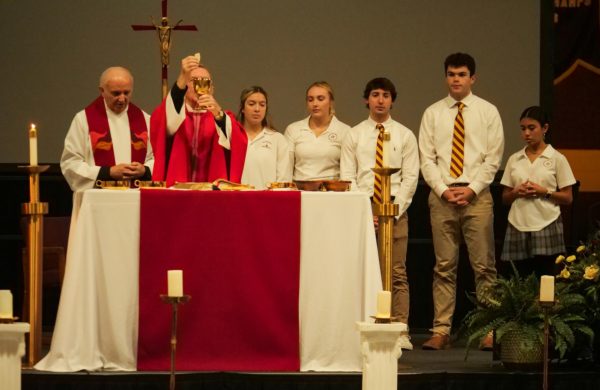Our complacency and the call to social justice
Upon reviewing Walsh Jesuit’s definition of “Committed to Doing Justice,” I felt a certain embarrassment and sense of irony as I compared it to the reality of our school. Fr. Pedro Arrupe’s entreaty to all of us, to effectively emulate being men and women for and with others, had never been discussed with me until this year. Many students do not realize our call.
According to the Profile of a Graduate at Graduation document, even though the full scope of commitment to justice is not expected to be developed in four years, the students’ “predispositions [should] have begun to manifest themselves.” This last line has always provided me with a cushion. It has always seemed to assure me, since I first read the article as a freshman, that it was alright if I chose not to understand the true meaning behind our mission. To not really be “committed.” And I think many of my classmates think the same way.
Arrupe was blatantly clear about how Jesuit education often “misses the mark” when it comes to truly equipping students to tackle issues of injustice in our world. However, I think a Jesuit education trains us better than any other alternative. As students at a predominately white school, from upper middle-class families with solid incomes, and as people with all sorts of opportunities at our fingertips, it is easy to view ourselves as “above” the call to work for justice. Many of us, definitely myself included, support the poor but believe it is the world’s duty to take care of them.
We just do not honestly see that as our own duty. Others will do it. There are saints out there who will devote their lives to stopping racism, fighting hunger, and lessening oppression, but since it does not directly affect me, I am not responsible to act. Arrupe shares that “whoever holds himself aloof from the battle for justice implicitly refuses love for his fellows and consequently for God.” I think we all hold ourselves aloof. Even as I serve on Labre, lead retreats, and pray for the end to injustice, I still separate myself from the poor. I do not identify with them. And I still do not think I will for a very long time, because it will take years of effort to rework the way my brain has been wired.
Why does this claim matter? Because four years of Jesuit education have nearly passed me by, and I am still, as Arrupe writes, “drugged by the comforts of privilege” and, therefore, “a silent [beneficiary] of the fruits of injustice.” I truly hope that myself and my classmates, my peers and my family members, and ultimately our community of privilege at large may work to understand how much influence we refuse to accept. I pray that the deeply ingrained seeds of injustice begin to be unraveled by the youth of today.


![It is in giving that we receive [Opinion]](https://thepioneerwjhs.com/wp-content/uploads/2024/03/IMG_6538-600x252.jpeg)


![War in Ukraine horrifies school community [Opinion]](https://thepioneerwjhs.com/wp-content/uploads/2022/03/9C7A948F-24DE-4E28-9E55-8707ADBC38B9-475x267.jpeg)
Brian Kudro • Oct 16, 2017 at 2:07 pm
Excellent article and heartfelt reflection–great job! An excellent invitation for our own self-reflection in regards to how “committed to doing justice” we all are–students, faculty, staff, administrators and parents alike!